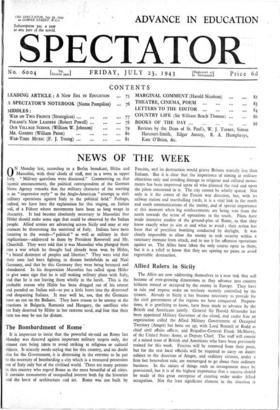NEWS OF THE WEEK O N Monday last, according to a
Berlin broadcast, Hitler and Mussolini, with their' chiefs of staff, met in a town in upper Italy. " Military questions were discussed." Commenting on that laconic announcement, the political correspondent of the German News Agency remarks that the military character of the meeting is an " impressive reply " to the Anglo-American " attempt to shift military operations against Italy to the political field." Perhaps, indeed, we have here the explanation for this staging, on Italian soil, of a Fiihrer whose movements have been so long wrapt in obscurity. It had become absolutely necessary to Mussolini that Hitler should make some sign that could be observed by the Italian people. Allied armies are advancing across Sicily and may at any moment be threatening the mainland of Italy. Italians have been listening to the words—" political " as well as military in their implications—addressed to them by President Roosevelt and Mr. Churchill. They were told that it was Mussolini who plunged them into a war which he thought had already been won by Hitler, " a brutal destroyer of peoples and liberties." They were told that their sons had been fighting in distant battlefields to aid Nazi Germany, and that by this Germany they were being betrayed and abandoned. In his desperation Mussolini has called upon Hitler to give some sign that he is still making military plans with Italy, and that he is not leaving them wholly in the lurch. This is the probable reason why Hitler has been dragged out of his retreat and paraded on Italian soil—to put a little heart into the distressed and despairing Italians. It may well be, too, that the Germans have an eye on the Balkans. They have reason to be uneasy at the reactions in Bulgaria, Rumania and Hungary, the satellites who see Italy deserted by Hitler in-her extreme need, and fear that their turn too may be not far distant.


























